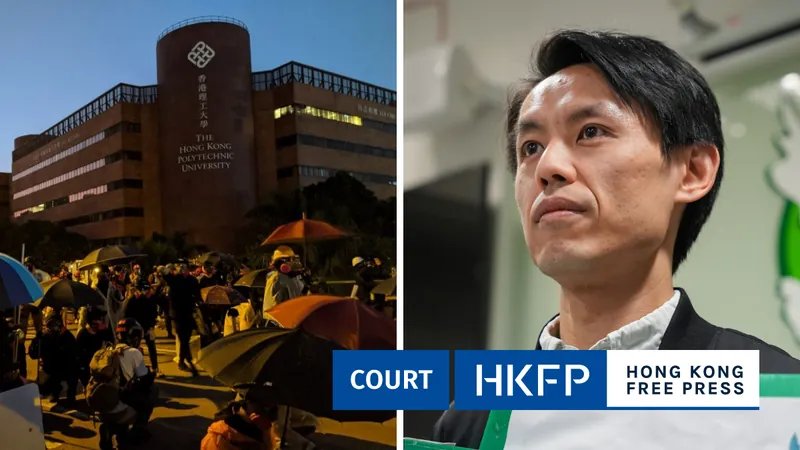
Hong Kong Court Supports Acquittal of Democratic Party Chair in Controversial 2019 Protest Case
2025-03-21
Author: Chun
Significant Ruling in Hong Kong
In a significant ruling, a Hong Kong court has firmly rejected the government's appeal regarding the acquittal of Democratic Party chairman Lo Kin-hei in connection with a 2019 protest case, affirming that the original trial judge's decision was not 'irrational.'
Court of Appeal's Decision
On Friday, the three-member Court of Appeal unanimously upheld the acquittal originally made by District Judge Ernest Lin in late 2022. Government prosecutors had argued that Judge Lin made mistakes in his ruling when he cleared Lo of participating in an unlawful assembly during the tense anti-extradition bill protests that swept the city in 2019.
Background of the Protest Case
On November 18, 2019, Lo was among 135 individuals arrested near the Chinachem Golden Plaza in Tsim Sha Tsui. This location was pivotal as protesters were heading to the Hong Kong Polytechnic University (PolyU), which had become a battleground between pro-democracy demonstrators and police forces, leading to one of the most intense confrontations during the protests.
Trial Judge's Observations
The trial judge noted that Lo had remained at the protest site for approximately 40 minutes, where demonstrators rallied with umbrellas and slogans. Judge Lin described Lo's actions as 'morally suspicious' and suggested that he aimed to benefit politically from the situation by aligning himself visibly with the protesters.
Insufficient Evidence for Intent
Despite this observation, Lin determined that there was insufficient evidence to prove Lo’s intent to engage in an unlawful assembly, thus leading to the acquittal. During the appeal, government lawyers contended that Lo's proximity to the demonstrations and his decision to stay amidst escalating conflict were indicative of support for the demonstrators, raising questions about his motives.
Defense Arguments
Lo’s defense team, however, argued that while their client may have created some suspicion, the context of his attire and limited interaction with the protestors did not affirmatively imply his participation in the unlawful assembly.
Judgment from the Appeal Panel
In its written judgment, the appeal panel acknowledged that the original trial judge may not have fully grasped certain legal precedents, labeling it 'regrettable' that Lin overlooked pertinent cases during the trial. However, they still concluded that the prosecution failed to demonstrate the necessary intent required to convict Lo.
Politician's Intentions
The justices reiterated that the original judge's conclusion, while debatable among different fact-finders, was by no means irrational. They also agreed with the notion that as a politician, Lo could have been seeking to enhance his political standing by positioning himself near the demonstrators, yet he lacked any of the traditional protest gear and did not directly confront law enforcement.
Backdrop of the Protests
The backdrop of the case is significant, as protests erupted in Hong Kong in June 2019 in response to a controversial extradition bill that many viewed as an infringement on the same city’s freedoms. This unrest led to widespread calls for greater democracy and accountability regarding police conduct. The situation escalated into prolonged confrontations, particularly at the PolyU, where police laid siege for nearly two weeks, resulting in over 1,300 arrests and hundreds hospitalized due to the violence.
Ongoing Tensions and Implications
This ruling underscores the ongoing tensions between the Hong Kong government and pro-democracy advocates amidst an evolving political landscape marred by unrest and calls for reform. With continued scrutiny of the judicial process and political repercussions, the implications of this ruling could resonate well beyond the courtroom, impacting Hong Kong’s socio-political fabric for years to come.


 Brasil (PT)
Brasil (PT)
 Canada (EN)
Canada (EN)
 Chile (ES)
Chile (ES)
 Česko (CS)
Česko (CS)
 대한민국 (KO)
대한민국 (KO)
 España (ES)
España (ES)
 France (FR)
France (FR)
 Hong Kong (EN)
Hong Kong (EN)
 Italia (IT)
Italia (IT)
 日本 (JA)
日本 (JA)
 Magyarország (HU)
Magyarország (HU)
 Norge (NO)
Norge (NO)
 Polska (PL)
Polska (PL)
 Schweiz (DE)
Schweiz (DE)
 Singapore (EN)
Singapore (EN)
 Sverige (SV)
Sverige (SV)
 Suomi (FI)
Suomi (FI)
 Türkiye (TR)
Türkiye (TR)
 الإمارات العربية المتحدة (AR)
الإمارات العربية المتحدة (AR)